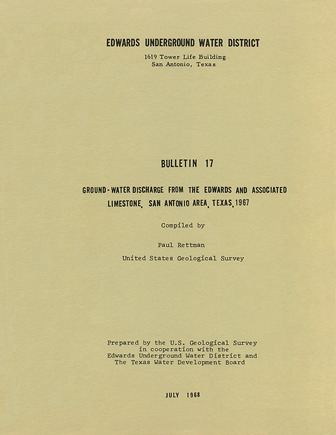Ground-Water Discharge from the Edwards and Associated Limestones, San Antonio Area, Texas, 1967

| Author | Rettman P (US Geological Survey) |
| Year | 1968 |
| Description | Annual report for 1967 on discharge from the Edwards Aquifer issued by the Edwards Underground Water District |
| Report Number | Bulletin 17 |
| Publisher | Edwards Underground Water District |
| Location | Edwards Aquifer Balcones Fault Zone San Antonio Segment |
| Cover | View Download |
| File | View Download |
| Summary |
|
Records of the ground-water discharge from the Lower Cretaceous Edwards and associated limestones in the San Antonio area are collected yearly as part of an overall hydrologic investigation by the U. S. Geological Survey in cooperation with the Edwards Underground Water District and the Texas Water Development Board . This investigation has continued for many years and has resulted in several geologic and hydrologic reports, some of which are listed in the references. The 1967 average discharge from the Edwards and associated limestones is presented in the table of this report by county area and by use . The discharge by springs was from San Marcos Springs in Hays County, Comal Springs in Comal County, San Antonio and San Pedro SprIngs in Bexar County, and the Leona River Springs in Uvalde County. The recorded discharge for Leona River Springs includes underflow. The spring discharge was compiled from gages operated by the Geological Survey at the points of discharge. Pumpage for agriculture was estimated from power consumption and acreage. Records of the Texas Water Development Board’s annual canvass of the municipal, military, and industrial pumpage in the San Antonio area were used in the preparation of the table in this report. Major discharge by wells was from Bexar, Uvalde, and Medina Counties, while the major springflow was from Comal and Hays Counties. Wells in Bexar County supplied water for municipal and military use, the largest single use in the San Antonio area. Other wells in Bexar County and most of the large wells in Uvalde and Medina Counties supplied the irrigation needs for an estimated 48,000 acres in this combined area. The remaining discharge, principally from wells in Bexar County, was for industrial, domestic, stock, and miscellaneous purposes. About 61 percent of the total discharge from the Edwards and associated limestones came from wells, and 70 percent of this discharge was from wells in Bexar County. Deficient rainfall during the spring and summer of 1967 was mainly responsible for an increased demand for water from wells. Well discharge in 1967 was 33 percent greater than in 1966, while the total discharge from wells and springs decreased by about 2 percent. |
Search for Documents
Advance Search
Explore EAA's Scientific Reports
- All Reports
- Geomorphology and Caves
- Weather Modification
- Geology
- Water Use and Conservation
- Geochemistry
- Water Resources Planning and Management
- Floods and Drought
- Water Quality
- Climatology
- Surface Water / Groundwater Relationship
- Biology
- Springs, Groundwater Discharge
- Archaeology
- RZ Protection
- Aquifer Levels
- Remote Sensing
- Precipitation
- Overview Studies
- Modeling
- Hydrology and Hydrogeology
- History
- Groundwater Recharge, Recharge Zone
- Groundwater Movement
